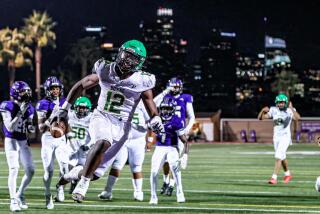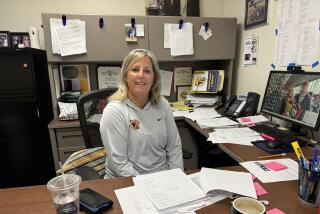City Coaches Say Time Off Is Not Time Well Spent : Preps: Two-week period that forbids coaches from having contact with players is getting a cool reception.
- Share via
It has been called the dead period for sports in the L.A. City schools.
No, it is not the name of a historical era or the title of a new horror novel by Stephen King.
But it has been nothing short of a nightmare for many City coaches.
The period is a two-week stretch, which started Jan. 6 and runs through Sunday, when teams cannot play games and coaches are not allowed to have any contact with their players.
The policy is a byproduct of the board of education’s decision to switch to a year-round school calendar. The policy was enacted because City school officials didn’t want coaches to work without pay during two weeks of the winter athletic season.
Most South Bay basketball coaches are not enamored with the idea of taking two weeks off in the middle of the season.
“Originally, when this first came out, it was supposed to be a one-week dead period and I don’t think anyone was all that upset about it,” Westchester boys’ Coach Ed Azzam said. “But when they told us it was going to be two weeks, the coaches said, ‘Wait a minute. What is this?’ I think a two-week dead period is just nonsense. It doesn’t make a bit of sense.”
Carson boys’ Coach Richard Masson said: “It’s just ludicrous because you spend a couple of months trying to condition the kids and build them up to a certain level and then the board of education, in their infinite wisdom, says you can’t practice for two weeks.”
It is particularly troubling for Narbonne boys’ Coach Bob Hoppes, who felt his team was starting on the upswing after it won the four-team Hamilton tournament early in the month.
“I’ve heard nothing positive about this from any of the coaches I’ve talked with,” Hoppes said. “You do all the things you can to be competitive and just about the time you have a finger on it, everything comes to a halt.”
Hoppes said he is concerned about how the two-week break will affect a team’s continuity and conditioning.
“My gosh, if I’m away from these kids for two weeks, I have absolutely no control over what they do,” he said. “I know they’re going to form some bad habits by the time they get back.”
Said Azzam: “We’re supposed to be doing this for the kids and without a doubt this is hurting the kids. There’s no way you can be off for two weeks and expect the kids to be ready to play in a game. There’s just no way.”
Banning girls’ Coach David DeLaby said he is worried that the layoff will hurt his squad significantly. The Pilots play Washington, the City’s No. 1 team, on Wednesday.
“We don’t have a lot of depth and I know that’s true for a lot of girls’ teams,” he said. “So I’m really concerned about the conditioning aspect of this. We don’t practice on Monday because of the holiday. So we come back and practice on Tuesday and play against the No. 1 team in the City the next day. I don’t think that’s fair.”
The break has helped Pilot guard Rayjanette Lampkin recover from an ankle injury.
“She will get a little break from it, but I’m concerned about the rest of my players and what kind of condition they’ll be in,” DeLaby said.
Coaches are also concerned that officials will not be able to properly enforce the two-week period.
“We are not practicing at all during this period but the question is: Who is practicing out there?” Banning boys’ Coach Mark Paez said. “I’m not sure everyone is living up to the letter of the rule. Not to point any fingers, but what kind of enforcement do we have for this?”
Coaches think they know the answers.
Azzam says he has no doubt that some teams are practicing illegally.
The only team that has been caught holding an illegal practice so far is the Narbonne girls’ basketball team, although the Gauchos avoided a penalty by agreeing not to repeat the action.
“A lot of schools are going to practice,” Azzam said. “They may not do it at their own school, but they’re going to practice. Of course, it’s wrong. But what are you going to do? It encourages you to cheat and that’s not something we should teach.
“It’s against my philosophy to cheat and that’s not what I want to teach my players, but there’s a lot of schools that do.”
Even if schools do break the rules, coaches say it will be nearly impossible for officials to enforce.
“What the district has said is they’ll come down on the cheaters hard and I say that’s just bull. . . . They’ve never come down hard on anyone over anything,” Azzam said. “So why should we expect it to be any different with this?”
DeLaby agreed.
“They haven’t tried to stop the other cheating that goes on with things like grades and recruiting, so they’re not going to do anything about this,” he said.
“It’s kind of like the honor system. A lot of schools will cheat, but some won’t.”
Many of the schools are holding informal practices, without coaches, although Hoppes doesn’t know whether that will help or hurt most teams.
“I’ve given our practice schedules to our two captains and they’re reliable kids, but there’s still going to come a time during the day when (practices) start to break down,” he said. “It’s not the same thing as a regular practice. Kids need that practice time and when they’re away for two weeks, it’s really going to kill some teams.”
Azzam said he is also concerned about the prospect of athletes getting injured during informal practices.
“What if a kid goes out and practices and gets hurt?” he said. “We haven’t heard that question a lot, but I guarantee you it’s going to happen.”
With that in mind, Paez thinks allowing coaches to hold voluntary practices during the two-week break makes more sense.
“I would like to have seen them say, ‘We can’t pay you for these two weeks, but if you want to practice on your own, go ahead,’ ” he said. “Just to keep everybody fresh, it would have been a good thing.”
Said Masson: “We’re not going to get paid anyway during these two weeks. So why don’t they say we can all at least volunteer . . . and practice.”
Azzam thinks teams should at least be allowed to practice during one of the two weeks, voluntary or not.
“I think a one-week break is not a bad idea because it makes the coaches take a week off,” he said. “Another week wouldn’t hurt you if you could practice (that) week. That would be perfect because there would be plenty of time to get the kids ready.”
Coaches say it will be like starting over when they return to practice.
“There are going to be injuries, no question about it,” Masson said. “You just can’t maintain your conditioning over two weeks on your own and expect to come back like you were before.”
Azzam, whose team has not held a formal practice since Dec. 18, said he will place his team on a crash course as soon as they return.
“I’ve already got a pretty good idea of what we’re going to need to do,” he said. “When we get back, I will almost have to destroy them the first day just to get that intensity back in them. Then the next day, we’re going to work on some of the finer points of the game. After that, we can’t practice too hard the next day because we have a game that Friday.”
DeLaby said some coaches are even considering getting out of the business because of the two-week period.
“A lot of coaches are talking about giving it up,” he said. “I know I may drop it after this year and I know a lot of coaches who are thinking the same way.”
Said Hoppes: “At the start of the year, I said I’d come back for one more season. But I’ll see how it works out this year. If it doesn’t work out to my satisfaction, I’m not going to be back next year. I just don’t need it that much.”
Masson, for one, is hopeful of changes in the policy.
“This is the first year of this and (City officials are) experimenting,” he said. “They’re just as uncertain about this as anyone else. It’s an unfortunate situation and I think they’re going to learn that after this year.”
Said DeLaby: “Most coaches were willing to try it once, but I don’t know how they’ll feel about it after this.”
More to Read
Get our high school sports newsletter
Prep Rally is devoted to the SoCal high school sports experience, bringing you scores, stories and a behind-the-scenes look at what makes prep sports so popular.
You may occasionally receive promotional content from the Los Angeles Times.






